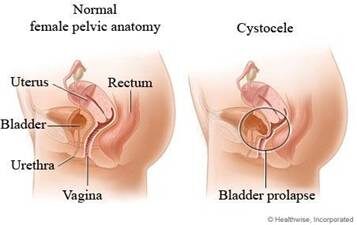
Bladder Prolapse
Bladder prolapse is also known as a cystocele. It is a common condition in women that involves weakening of the pelvic floor muscles and bladder floor. Once this occurs, the bladder gradually sags into the vagina and may even protrude through its opening, causing urinary problems including incontinence, frequency, urgency and infections among others. Normally, in women, the bladder is held in position by the muscles of a supportive pelvic floor and ligaments. When the muscles and tissues are stretched and weakened, the bladder can sag through the ligaments and into the vagina, resulting in bladder prolapse or cystocele.
Causes of Bladder Prolapse
Bladder prolapse can be caused by many different factors, the most common being stress placed on muscles during childbirth. Women who have had multiple vaginal births especially close together are at a higher risk for developing prolapse. Bladder prolapse may become more severe after menopause because the drop in estrogen affects the strength of the pelvic tissue. Other less common causes of this condition include:
● Heavy lifting
● Chronic cough
● Obesity
● Frequent straining during bowel movements
● Previous pelvic surgery such as hysterectomy
Symptoms of Bladder Prolapse
Women with bladder prolapse often experience many troubling symptoms such as frequent urination and incontinence. If mild, women may not experience any symptoms. Other symptoms that may occur as a result of this condition include:
● Lack of relief after urinating
● Urinary tract infections
● Pain in the vagina, pelvis or abdomen
● Heaviness or pressure in the vaginal area
● Painful Intercourse
● Difficult bowel movements
Diagnosis of Bladder Prolapse
Your provider can usually diagnose bladder prolapse with a pelvic examination. The following tests may also be required to further determine problems in other parts of the urinary system:
• Urodynamics
• Cystoscopy
• Cystourethrogram or other imaging
Treatments for Bladder Prolapse
Treatment for bladder prolapse varies, depending on the severity of the condition and patient preference. Treatments may include:
● Kegel exercises to strengthen the pelvic floor muscles
● Pelvic floor rehab
● Insertion of a pessary device to provide better support for the organs
● Surgery for severe cases to repair cystocele
Complications of Bladder Prolapse
Left untreated, bladder prolapse may continue to worsen with time and may lead to issues in the future including urinary retention and eventual kidney damage. Most cases of bladder prolapse can be effectively treated without the need for surgery.
